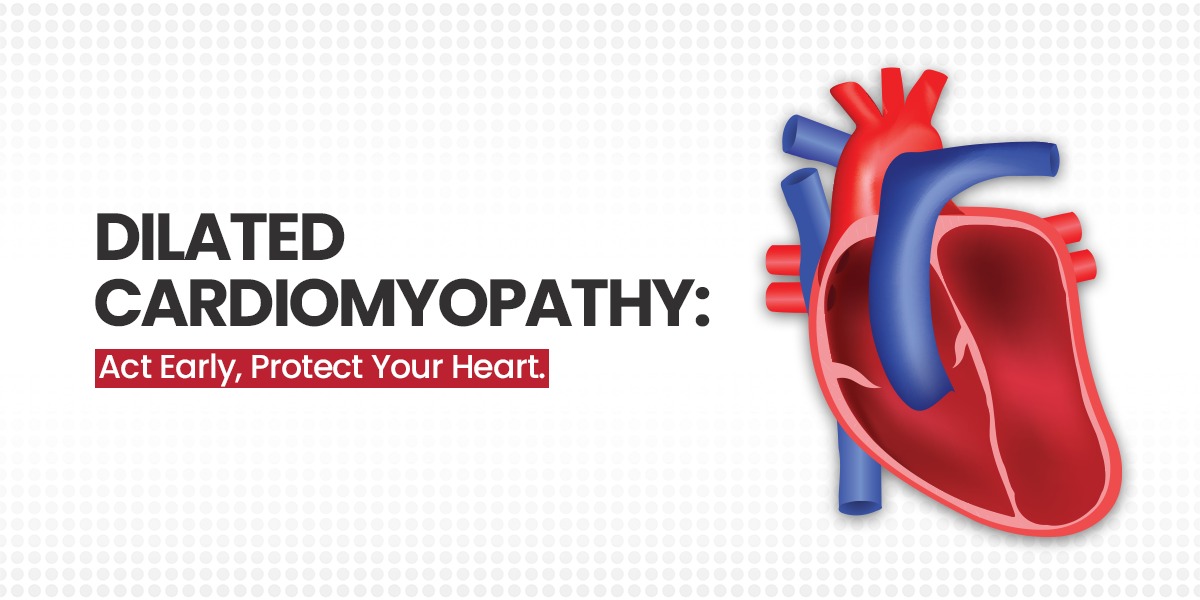Dilated Cardiomyopathy Meaning & How It Impacts Heart Health

Dilated cardiomyopathy is a condition where the heart’s main pumping chamber is enlarged and weakened. This impacts the heart’s ability to pump blood effectively. It can strike at any age, but it occurs more in adults aged 20 to 60. If identified early and dealt with in the right manner, serious issues such as heart failure or arrhythmias can be prevented.
Dilated Cardiomyopathy Meaning
- Dilated cardiomyopathy is a heart disease where the heart’s left ventricle is weakened and dilated.
- Such enlargement reduces the heart’s efficiency in circulating blood to the body, thus resulting in heart failure.
- It may happen at any age but is common between the ages of 20 and 60 years.
How Dilated Cardiomyopathy Affects Heart Health
Knowing how DCM affects the heart helps people understand its severity and the importance of proper treatment. Its most significant effects are:
- Decreased Pumping Efficiency: The compromised heart is unable to contract properly, leading to ineffective blood circulation.
- Increased Risk of Blood Clotting: Ineffective blood circulation can lead to clotting, causing the risk of stroke.
- Heart Rhythm Disorders: DCM may lead to arrhythmias or abnormal heart rhythms.
- Progression to Heart Failure: Extensive weakening of the heart muscle may result in chronic heart failure.
Dilated Cardiomyopathy Causes
Several factors may contribute to the development of dilated cardiomyopathy in an individual. They are inherited, lifestyle-oriented, or disease-related.
- Genetic Mutations: Inherited mutations that affect heart muscle protein.
- Viral Infections: Inflammation and damage to the heart by certain viruses.
- Alcohol Abuse: Chronic alcohol consumption over a long time damages the myocardium.
- Toxins and Drugs: Certain drugs used for chemotherapy, and certain illegal drugs, damage the heart muscle.
- Autoimmune Disorders: Conditions in which the immune system of the body attacks the heart.
- Nutritional Deficiency: Inadequate intake of thiamine and other nutrients contributes to the development of DCM.
- Chronic Disorders: Uncontrolled high blood pressure or diabetes can increase the risk of DCM.
Symptoms of Dilated Cardiomyopathy
Recognizing the initial signs of dilated cardiomyopathy is essential for early treatment. Common signs that could signal that the heart is not effectively pumping blood are:
- Shortness of breath during activity or rest
- Fatigue and weakness
- Swelling of legs, ankles, or stomach
- Abnormal heart rhythm or palpitations
- Fainting or lightheadedness
Diagnosis
Accurate diagnosis of DCM enables physicians to assess severity and begin proper dilated cardiomyopathy treatment. Various tests can detect the condition and underlying causes.
- Echocardiogram: Measures heart size and pumping ability.
- Electrocardiogram (ECG): Detects irregular heartbeat.
- Cardiac MRI: Gives a detailed visualization of the heart structure.
- Blood Tests: Detects causative factors and signs of heart trauma.
- Cardiac Catheterization: Measures pressures and blood flow within the heart.
Dilated Cardiomyopathy Treatment
Dilated cardiomyopathy treatment focuses on enhancing heart function, controlling symptoms, and averting complications. Frequent treatments include:
Medications:
- ACE inhibitors and beta-blockers to decrease strain on the heart.
- Diuretics for controlling fluid accumulation.
- Antiarrhythmic medications are employed to manage abnormal heart rhythms.
Lifestyle Modifications:
- Low-salt diet to manage swelling.
- Restriction of alcohol and caffeine consumption.
- Routine exercise with medical guidance.
Surgical Procedures:
- Implantable cardioverter-defibrillators (ICDs) to avert sudden cardiac death.
- Cardiac Resynchronisation therapy (CRT) and conduction system Pacing (CSP) for cares refractory to optional medical therapy.
- Heart transplantation in severe situations.
- Managing Underlying Causes: Control of hypertension, diabetes, or autoimmune diseases can slow the course of the disease.
Lifestyle with Dilated Cardiomyopathy
Living with dilated cardiomyopathy involves more than medication; it’s also a matter of taking daily care and adopting healthy practices. Patients must pay attention to:
- Regular Monitoring: Regular echocardiograms and follow-up consultations to monitor heart function.
- Adherence to Medicines: Adhering to prescribed medications to experience stable heart rhythms and blood pressure.
- Symptom Tracking: Monitoring for sudden weight gain, swelling, or unexpected fatigue for prompt reporting to the doctor.
- Support Systems: Frequent visits to patient support groups to provide advice and moral support.
- Emergency Readiness: Having emergency numbers and a personal medical record readily available in the event of exacerbation of symptoms.
Symptoms can be effectively managed, and an active life can be lived by adherence to regular treatment and a healthy lifestyle modification.
When to Seek Medical Attention
Early intervention can show beneficial effects on the outcome. In case of unexplained fatigue, recurring swelling, or abnormal heartbeat, consult a specialist.
Live in or near Kanpur? Visit a cardiology hospital in Kanpur for an accurate diagnosis and effective treatment for dilated cardiomyopathy.
Conclusion
Awareness regarding dilated cardiomyopathy, identification of causes, and acting on early warning signs are all vital to healthy hearts. If the treatment by a doctor, lifestyle modification, and constant monitoring all have a combined effort, then patients can control DCM well. Prevention and vigilance are highest in managing life when suffering from this disease.
Also Read: 10 Ways to Keep Your Heart Healthy and Strong!

 Call-an-Ambulance
Call-an-Ambulance



